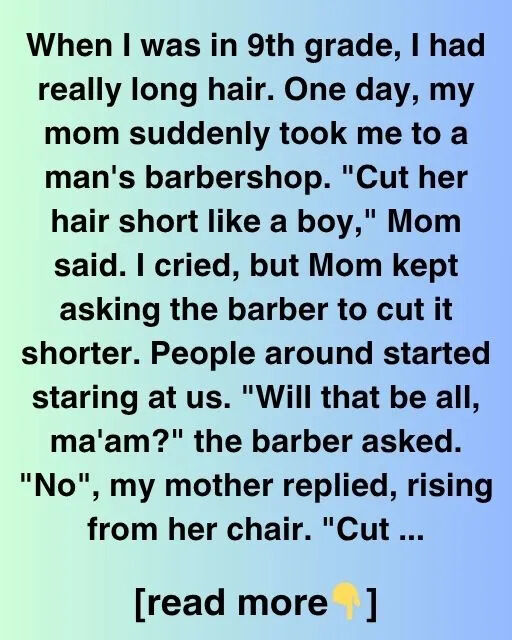
When I was in 9th grade, I had really long hair. One day, my mom suddenly took me to a man’s barbershop. “Cut her hair short like a boy,” Mom said. I cried, but Mom kept asking the barber to cut it shorter. People around started staring at us. “Will that be all, ma’am?” the barber asked. “No”, my mother replied, rising from her chair. “Cut it even shorter.”
I felt like I was in a nightmare I couldn’t wake up from. My hair fell to the floor in thick clumps. The barber hesitated every time he took the scissors near my head, looking at me in the mirror with eyes that seemed to say he was sorry. But Mom’s glare kept him going.
When he finally finished, my reflection looked like a stranger. My head felt lighter, but my heart felt heavier than ever. Tears streamed down my cheeks as I stepped down from the barber chair. Everyone in the shop pretended not to look, but their eyes followed me until I left.
Outside, Mom didn’t say a word. She just grabbed my wrist and pulled me toward the bus stop. I remember every crack in the sidewalk, every dog barking in the distance, and the way my scalp tingled in the cold breeze. I remember thinking, “Why is this happening to me?”
That night, I stared at myself in the bathroom mirror for hours. I didn’t recognize the girl staring back. My hair had been the one thing I loved most about myself. I used to spend hours brushing it, braiding it, letting it flow down my back. Now, it barely covered my ears. I felt naked, exposed, like every flaw on my face was magnified without the curtain of my hair. When I went to school the next morning, people gasped. Some laughed, others whispered. A boy I had a crush on covered his mouth to hide his giggle. I wanted to disappear into the floor.
A few of my friends tried to comfort me, but their words fell flat. “It’s just hair, it’ll grow back,” they said, but they didn’t understand. My hair wasn’t just hair to me. It was my comfort, my shield, my identity. Over the next few weeks, I started avoiding mirrors. I wore hoodies with big hoods, trying to hide as much of my head as possible. At lunch, I sat alone, picking at my food while everyone else chatted. My grades slipped. Teachers started asking if everything was okay at home. I would nod and force a smile, but inside, I was screaming.
My mom didn’t notice the change in me. Or maybe she did, but didn’t care. She worked long hours and came home tired, complaining about money, her boss, or how ungrateful I was. One night, I gathered the courage to ask her why she made me cut my hair. She looked at me, eyes cold, and said, “You were getting too vain. I wanted to teach you a lesson.” Then she turned back to her phone. I remember going to bed that night feeling like something inside me had broken.
Weeks turned into months. My hair started to grow back, but so did the memories of that day. Every time I looked at the uneven patches that grew slower than the rest, I remembered the sound of the scissors, the smell of the barbershop, the looks of the people around me. I started spending more time in the library, hiding among the shelves, burying myself in books. I read about girls who went through worse things than me, who found ways to heal. I read stories about forgiveness, about mothers who hurt their daughters but later asked for forgiveness. I wondered if my mom would ever say sorry.
One afternoon in spring, a new girl named Nura transferred to our school. She wore her hair shorter than mine had ever been, but she carried herself with a confidence I couldn’t understand. During group work, she sat next to me. She complimented my hoodie, and I shyly thanked her. By the end of the class, we were laughing about how confusing math was. For the first time in months, I felt a tiny spark of happiness. Nura and I started sitting together during lunch. She told me she had cut her hair short by choice, to donate it to children with cancer. I admired her so much, and it made me realize how different it felt when a haircut was your decision, not someone else’s.
One day, I confessed to Nura what had happened. She didn’t gasp or pity me. She just held my hand and said, “I’m so sorry you went through that. But you know what? Hair grows back, and so does your spirit.” Those words stuck with me. I started wearing my head high, even if my hair was still awkward. I stopped hiding under my hoodies. Slowly, I started making more friends again. Teachers noticed I was participating more. My grades improved. The boy I had liked before even tried to talk to me again, but I realized I didn’t need his approval. I had found friends who saw me for who I was, not just how I looked.
At home, things were still tense. Mom and I barely spoke. She would complain about her work, the bills, the weather, but we never talked about what had happened. One evening, I heard her crying in the kitchen. I peeked around the corner and saw her holding a stack of unpaid bills. Her should